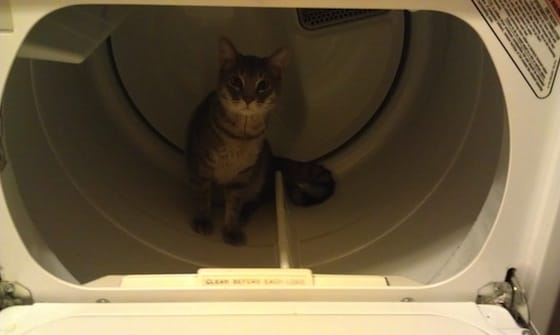In the market for a used clothes dryer? Welcome to the Priceonomics price guide for dryers. Just put any model of clothes dryer in our search box and we’ll tell you the fair price for it. Or you can browse popular dryer brands from this page. Since dryers are kind of heavy and a pain to move, you can get a great deal on them buying them used! To kick off our dryers price guide, we have a helpful buying guide from Priceonomics contributor Valerie Farabee!

Image credit: Imgur.
Dryer deals, steals and ideals: buying guide for clothes dryers made simple
Whether you are buying a used or new clothes dryer, it’s important to do some homework about what are the different types of dryers out there and what you need to know to get a good deal.
Electric Versus Gas
Your laundry room has a gas hook-up or a power outlet. When you start looking for a dryer, make sure you are looking for the right one! Is it powered by gas or electricity?
Electric dryers are by far the most common, and the initial purchase price is usually $50-$100 cheaper than gas dryers. Though the initial cost is higher, gas dryers are more cost efficient than electric dryers in the long run. Most of us have power outlets in our laundry rooms and will default to an electric dryer.
How Do I Vent Thee? Let Me Count the Ways.
Where does the hot air go when it’s done? Most dryers are vented externally through a wall and out of the house, a simple solution. If you can’t vent externally, as is the case for apartment dwellers and condominium owners, your best bet is a condensation dryer. Condensation dryers either collect extracted water (condensation) in a bucket connected by a tube outside of the dryer, or hook straight into your plumbing, depending on the situation.
Space Wars
The next thing to consider is how much space you have available for an appliance. Do you live in a sprawling home in the suburbs or a funky studio apartment in the city? If you live in a smaller area, space consideration will be a very important part of how you choose your dryer. For city dwellers, there are also compact dryers that are about half the capacity of full size dryers and can be stacked on top of the washer. If you have a full size laundry room and a big family, go for an oversize dryer that will dry a load quickly, it only makes sense.
C-A-P-A-C-I-T-Y, Capacity!
Capacity is key. Living in an apartment, the most desirable situation is to have largest capacity with the smallest footprint available. Overloading your dryer regularly will significantly shorten the lifespan of your appliance.
Choosing capacity really comes down to your lifestyle. If you have kids and pets and a house you need more space and the ability to do larger loads at a time. Single apartment dwellers can get away with using compact appliances without even noticing a difference. Don’t scrimp on space, it will come back to haunt you in the future.
An EnergyStar is Born
Before you waste your time researching the EnergyGuide to EnergyStar dryers, you should know that according to EnergyGuide, clothes dryers aren’t rated in the government program because there is very little difference in the energy use between models. You can reduce energy in other ways by using the moisture sensor cycle in the dryer or the high spin cycle in your washing machine. Because both of those settings reduce the amount of drying time needed, they will ultimately use less energy.
Does it Sing Sweetly?
After you’ve considered all of the above, a fun thing to do is compare buzzers! Most dryer alerts vary from the pitiful bleating of a sound effect on its last legs to a panic inducing, sound barrier shattering buzz that will wake the neighbors. Newer models have sweet, gentle melodies that tenderly signal you when your laundry is indeed ready to be lovingly folded and put away in the warm arms of your chest of drawers, armoire or closet. A melody that makes all the difference!



